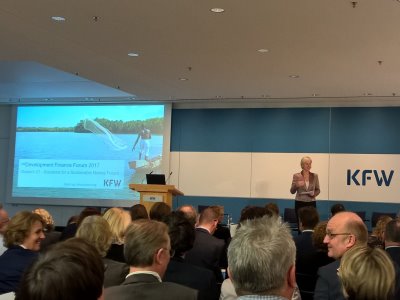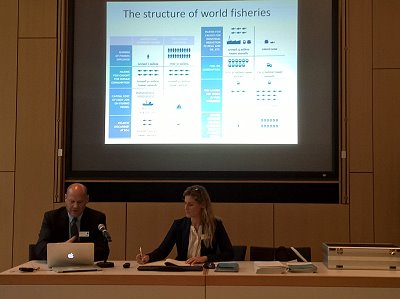KfW is a German government-owned development bank. From 21 to 22 November 2017, it convened its Development Finance Forum 2017 (DFF) titled 'Ocean’s 21 - Solutions for a Sustainable Marine Future' at its HQ in Frankfurt. Considering oceans as the next ecological frontier, KfW attracted 150 experts from all over the world to this flagship event to discuss ways to ease the burden on the oceans and to draw up a list of recommendations and priorities for development cooperation.
 Board member Professor Joachim Nagel, who opened the meeting, said, "Keeping the oceans intact is one of humanity's great challenges and can only succeed through international cooperation." That is why KfW will significantly increase its commitment to the oceans in the future.
Board member Professor Joachim Nagel, who opened the meeting, said, "Keeping the oceans intact is one of humanity's great challenges and can only succeed through international cooperation." That is why KfW will significantly increase its commitment to the oceans in the future.
Recent activities in this area include the "Blue Action Fund", which KfW set up on behalf of the German Federal Government at the end of 2016. The Fund is a new marine protection instrument because it intends to enable governmental and non-governmental actors doing more together. Specifically, it is about identifying more protected areas, promoting environmentally friendly fisheries, sustainable aquaculture and soft tourism. The start-up capital amounts to EUR 24 million and is expected to grow significantly as additional donors will step in. Sweden has already joined in, other donors have expressed interest. State Secretary Thomas Silberhorn of the Ministery for Cooperation (BMZ) announced at the DFF that this year another 12 million EUR will be added to this fund.
What tools might still be available for effective marine protection and what action would be needed - experts in three different workshops discussed these and other issues: marine economy, marine conservation and marine litter. At the end of the two-day meeting, they had developed a catalog with concrete and practical recommendations in order to advance the further work of KfW, but also that of other actors in marine protection.
Recommendations from Development Finance Forum 2017 are to be published soon on the KfW DFF webpage, and including:
Financing of Marine Conservation and the Blue Economy
1. Extending protection: The international targets of protecting 10 per cent of coastal and marine areas are the absolute minimum. Tripling this amount based on scientific evidence and existing conventions should be strived for.
2. Effective MPA management and long-term financing: For the establishment and the effective management of marine protected areas (MPA) it is imperative to provide broad investment and long term financing mechanisms, including conservation trust funds, user fees and government subsidies.
3. Establishing representative MPA networks: Available instruments such as “locally managed MPA” or “larger scale MPA” need upscaling and should be part of connected and representative MPA networks. These networks should be built in cooperation with the public and the private sector within marine spatial frameworks. Donors and Development Finance Institutions (DFI) need to support governments, the private sector and NGOs in the preparation of projects to enhance MPA networks.
4. Improving governance, including the participation of local population: For the long-term success of all conservation efforts and in order to achieve sustainability, it is crucial that the local population participate in protected area management. This is to be reached by improved governance and enabling conditions including equitable local user rights. The two FAO voluntary guidelines on tenure & small scale fisheries and on securing sustainable small scale fisheries (VGSSF) as well as the FAO Code of conduct for responsible fisheries (CCRF) are providing the respective frameworks.
5. Investing in sustainable fisheries management and aquaculture: A lot more investment is needed in an effective management of sustainable fisheries and aquaculture, to leverage their part in food production and to reduce the pressure on marine and coastal ecosystems. Supporting local communities and sustainable small-scale fisheries is an essential component of an inclusive Blue Economy. That should include facilitated access to financial and social services for small-scale fisheries. Market driven incentives like certification schemes play a vital role in this context.
6. Enhancing the value chain: Value chains in both sustainable fisheries and aquaculture have to be improved and more investment in reducing post-harvest losses is urgently needed to increase local value addition and to ensure fair distribution of benefits.
7. Increasing surveillance: Investment in control and surveillance to combat illegal fishing (IUU) is indispensable.
8. Conserving the High Seas: The conservation of the High Seas needs governance systems and new instruments, beyond classical Overseas Development Assistance (ODA) and support programmes. The negotiations on “Biodiversity Beyond National Jurisdiction”, starting in 2018, provide a good opportunity to move conservation and sustainable use in this field. The governance of the High Seas depends on effective Regional Ocean Management Organisations addressing sustainable use and conservation of maritime resources.
Financing the Combat against Marine Litter
 9. Scaling up waste management on land: To avoid waste entering the Ocean, comprehensive waste management programmes on land, beyond pure project financing, are needed. Therefore, political buy-ins at all levels, locally, regionally, nationally and internationally are imperative.
9. Scaling up waste management on land: To avoid waste entering the Ocean, comprehensive waste management programmes on land, beyond pure project financing, are needed. Therefore, political buy-ins at all levels, locally, regionally, nationally and internationally are imperative.
10. Convincing decision makers: Solid waste management systems are not as expensive as thought. Cost effective solutions creating sustainable local employment are within reach for all countries and should be strived for everywhere.
11. Supporting municipalities: Support for municipal entities is needed in setting up collection facilities and safe disposals to 100 %. They also need support for the establishment and operations of sound solid waste implementation systems, e.g. by government funds.
12. Improving Governance: Effective solid waste management needs better governance, clear responsibilities and legislation, sound institutions, cost recovery systems and a data revolution.
13. Creating new products and designs: Solutions for product and use redesign, especially concerning micro plastics, are imperative in addressing plastic marine litter upstream. The search for such solutions should be promoted.
14. Increasing producer responsibility: Producers have to be made responsible for the waste connected with their products. An extended producer responsibility is an opportunity to raise additional financial resources for the system.
15. Reaching higher recycling rates: Higher recycling rates are necessary; next to systematic approaches, they require the segregation at the source – at least for organic and non-organic. They also need behavioural changes that can best be achieved in working with young people and schools.
16. Prioritize countries: It is important to start with countries with the highest impact and there in locations, close to waterways like lakes and rivers
The discussions and the collection of recommendations and orientations illustrate well that the issues are often connected and need addressing in a comprehensive way at these interconnected levels. These are also reflected in the broader Sustainable Development Goals of Agenda 2030, which form the backdrop of the identified priority actions to protect and recover the ocean.








